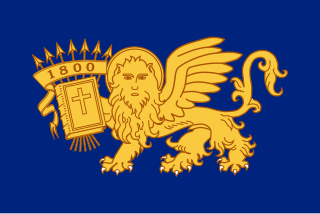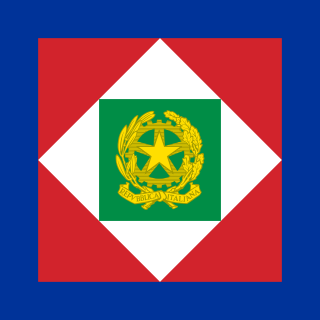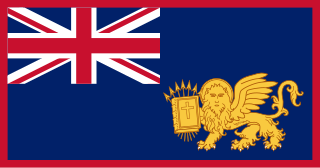External links
- Text of the Constitution (in Italian)
The Constitution of the Italian Republic (Italian : Costituzione della Repubblica Italiana), was the constitution of the Italian Republic, a client republic of France under Napoleon Bonaparte, roughly comprising the modern-day northern regions of Lombardy and Emilia-Romagna. It came into effect on 26 January 1802.
A head of state is the public persona of a state or sovereign state. The specific naming of the head of state depends on the country's form of government and separation of powers; the head of state may be a ceremonial figurehead or concurrently the head of government and more.

The politics of Italy are conducted through a parliamentary republic with a multi-party system. Italy has been a democratic republic since 2 June 1946, when the monarchy was abolished by popular referendum and a constituent assembly, formed by the representatives of all the anti-fascist forces that contributed to the defeat of Nazi and Fascist forces during the liberation of Italy, was elected to draft a constitution, which was promulgated on 1 January 1948.
A republic, based on the Latin phrase res publica, is a state in which political power rests with the public through their representatives—in contrast to a monarchy.

The government of Italy is that of a democratic republic, established by the Italian constitution in 1948. It consists of legislative, executive, and judicial subdivisions, as well as of a head of state, known as the president.

The 26 cantons of Switzerland are the member states of the Swiss Confederation. The nucleus of the Swiss Confederacy in the form of the first three confederate allies used to be referred to as the Waldstätte. Two important periods in the development of the Old Swiss Confederacy are summarized by the terms Acht Orte and Dreizehn Orte.

The regions of Italy are the first-level administrative divisions of the Italian Republic, constituting its second NUTS administrative level. There are twenty regions, five of which are autonomous regions with special status. Under the Constitution of Italy, each region is an autonomous entity with defined powers. With the exception of the Aosta Valley and Friuli-Venezia Giulia (2018–2020), each region is divided into a number of provinces.

Freedom of peaceful assembly, sometimes used interchangeably with the freedom of association, is the individual right or ability of people to come together and collectively express, promote, pursue, and defend their collective or shared ideas. The right to freedom of association is recognized as a human right, a political right and a civil liberty.

The Cisalpine Republic was a sister republic or a client state of France in Northern Italy that existed from 1797 to 1799, with a second version until 1802.

The Septinsular Republic was an oligarchic republic that existed from 1800 to 1807 under nominal Russian and Ottoman sovereignty in the Ionian Islands.

The Italian Parliament is the national parliament of the Italian Republic. It is the representative body of Italian citizens and is the successor to the Parliament of the Kingdom of Sardinia (1848–1861), the Parliament of the Kingdom of Italy (1861–1943), the transitional National Council (1945–1946) and the Constituent Assembly (1946–1948). It is a bicameral legislature with 600 elected members and a small number of unelected members. The Italian Parliament is composed of the Chamber of Deputies, as well as the Senate of the Republic.

The Constitution of the Italian Republic was ratified on 22 December 1947 by the Constituent Assembly, with 453 votes in favour and 62 against, before coming into force on 1 January 1948, one century after the previous Constitution of the Kingdom of Italy had been enacted. The text, which has since been amended sixteen times, was promulgated in an extraordinary edition of Gazzetta Ufficiale on 27 December 1947.
A national language is a language that has some connection—de facto or de jure—with a nation. The term is applied quite differently in various contexts. One or more languages spoken as first languages in the territory of a country may be referred to informally or designated in legislation as national languages of the country. National languages are mentioned in over 150 world constitutions.

The Ligurian Republic or Republic of Liguria was a French client republic formed by Napoleon on 14 June 1797. It consisted of the old Republic of Genoa, which covered most of the Ligurian region of Northwest Italy, and the small Imperial fiefs owned by the House of Savoy inside its territory. Its first Constitution was promulgated on 22 December 1797, establishing a directorial republic. The directory was deposed on 7 December 1799 and the executive was temporarily replaced by a commission. In 1802, a doge was nominated for a 5-year term, according to the second Constitution imposed by Napoleon, and a Senate was established.

The president of Italy, officially titled President of the Italian Republic, is the head of state of Italy. In that role, the president represents national unity, and guarantees that Italian politics comply with the Constitution. The president is the commander-in-chief of the Italian Armed Forces and chairs the High Council of the Judiciary. The president serves a seven-year term, with no term limits. The incumbent president is former constitutional judge Sergio Mattarella, who was elected on 31 January 2015, and re-elected on 29 January 2022.
A senator for life is a member of the senate or equivalent upper chamber of a legislature who has life tenure. As of 2023, five Italian senators out of 205, two out of the 41 Burundian senators, one Congolese senator out of 109, and all members of the British House of Lords have lifetime tenure. Several South American countries once granted lifetime membership to former presidents but have since abolished the practice.

The Italian Constituent Assembly was a parliamentary chamber which existed in Italy from 25 June 1946 until 31 January 1948. It was tasked with writing a constitution for the Italian Republic, which had replaced the Kingdom of Italy after the 1946 Italian institutional referendum.

The United States of the Ionian Islands was a Greek state and amical protectorate of the United Kingdom between 1815 and 1864. The successor state of the Septinsular Republic, it covered the territory of the Ionian Islands, as well as the town of Parga on the adjacent mainland in modern Greece. It was ceded by the British to Greece as a gift to the newly enthroned King George I, apart from Parga, which had been sold to Ali Pasha of Ioannina in 1819.
The present Constitution of the Republic of Albania was adopted by the Parliament of Albania on 21 October 1998 and certified by presidential decree on 28 November 1998, following a public referendum which approved the new Constitution. It is split up over many different acts. The document succeeded the 1976 Constitution, originally adopted at the creation of the People's Socialist Republic of Albania on 28 December 1976 and heavily amended on 29 April 1991.

The Council of Ministers is the principal executive organ of the Government of Italy. It comprises the President of the Council, all the ministers, and the Undersecretary to the Prime Minister. Deputy ministers and junior ministers are part of the government, but are not members of the Council of Ministers.

The law of Italy is the system of law across the Italian Republic. The Italian legal system has a plurality of sources of production. These are arranged in a hierarchical scale, under which the rule of a lower source cannot conflict with the rule of an upper source.